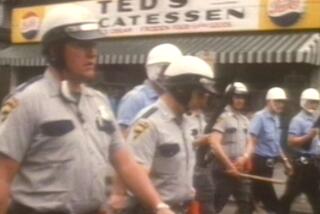TV REVIEWS : ‘Fear’ Sees Inequity in Private Police
- Share via
Is there something to KCET-TV Channel 28 scheduling “Fear in America,” the first episode of the occasional series “A Reverse Angle,” late at night, when the very fear of crime that the program examines happens to reach its apex? Perhaps; but at any hour, this is a report that presents a challenge to standard political agendas.
Hosted by fellow neo-conservative New Republic magazine writers and weekend TV pundits Fred Barnes and Morton Kondracke--without their usual hyped-up rhetoric--”Fear in America” (at 11 p.m. Sunday) is actually a report told not from the right but from the impassioned center.
That center is best personified here by Adam Walinsky, former assistant to Robert F. Kennedy and current promoter of a “Police Corps” that sounds close to Bill Clinton’s idea for national youth service (although no one makes an explicit connection).
Walinsky’s view, echoed less forcefully by Barnes and Kondracke, is that “societies can die from fear” because funding of private security allows the deterioration of public spaces and freedom. Money that may have gone to put more cops on the street for community-based policing and to make parks safe for kids is instead used to pay for everything from security gates to rent-a-cops. Those who can pay for their safety may, Walinsky argues, forget about those left behind.
The many minutes devoted to those taking security into their own hands show people who can afford guns, car alarms and phones, barbed wire and karate classes. Those too poor for such devices are precisely the most likely victims of violent crime, which is why the always-defeated L.A. city measures to fund more police--such as the losing Proposition 1 on Tuesday’s ballot--are consistently supported more by inner-city voters than suburban ones. Among its other messages, “Fear in America” reads the riot act to the type of voter who defeated Proposition 1.
The report shows that additional police, as in the New York subway system, reduce crime and graffiti, and that people in poor neighborhoods appreciate the humanism of the kind of community-based policing that Los Angeles Police Chief Willie Williams supports. But, until such projects are funded, they are only good ideas.
Politics, of course, is tied up in all of this, and it is warping standard left-right precepts. Law-and-order conservatives no longer have a quarrel with many liberals. But this report shows that anti-government conservatives must confront Walinsky’s warnings of the danger of privatizing what should be a public concern.
More to Read
The complete guide to home viewing
Get Screen Gab for everything about the TV shows and streaming movies everyone’s talking about.
You may occasionally receive promotional content from the Los Angeles Times.






